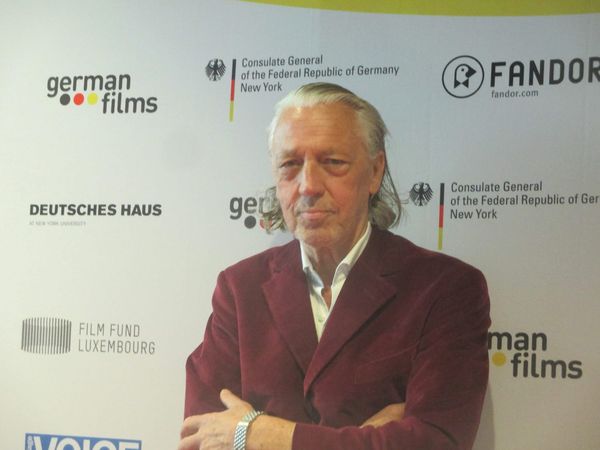Charles Schumann, the subject of Marieke Schroeder's globe-trotting, probing Bar Talks By Schumann (Schumanns Bargespräche), following the screening at KINO! in New York, joined me inside the bar of the Landmark at 57 West for a conversation. We go from Luis Buñuel's autobiography My Last Sigh, to authors Maxim Biller and Claudius Seidl at the Victoria Bar in Berlin creating a David Lynch Black Lodge Twin Peaks moment for me, to The New York Times cocktail and drinks writer Robert Simonson, and on to Charles working with Yohji Yamamoto, Issey Miyake and Hugo Boss.
Wim Wenders, who directed the documentary on Yamamoto, Notebook On Cities And Clothes, remarked in an e-mail to me this morning that "Charles is a great friend. And among others the best bartender in the world…"
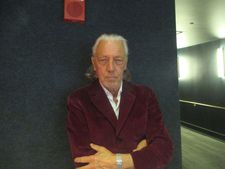 |
| Charles Schumann on keeping in shape: "I need it because sometimes my work, I say it in the film too, it's very long, very hard." Photo: Anne-Katrin Titze |
Charles Schumann, the man who single-handedly changed bar culture in Munich, then Germany, then all over the world is seen walking the streets of New York or Tokyo, more listening than talking to colleagues from bars, who proudly share their secrets with the master. Cuba, Paris, Vienna - he smiles attentively and soaks up the stories and watches what potions are mixed where and how.
We meet Günter Mattei, the graphic artist who designed Schumann's books as he recounts that Charles instructed him to get inspiration from bibles for the look of his American Bar Book and how the two of them tested the recipes for 500 cocktails within 18 hours. Schumann himself prefers "free pouring". Why should anyone even want each drink to be exactly the same? It is important to keep in mind that this is not a circus act and to "shake the shaker, not yourself."
We learn that the magic ingredient for a successful bar is distance and in Japan how important it is to "shape the space between the ice and the glass."
The original Schumann's American Bar at Maximilianstrasse 36, offset from the boulevard, in the navel of cultural Munich had an enormous appeal and a spirit of its own, perpetually creating its own myth. The creator and owner's unique energy was feeding it. International and Bavarian simultaneously, the place provided a dangerous cosiness, an aura to fight with and succumb to.
Anne-Katrin Titze: As I told you before the screening I turned 18 at midnight in your bar. You made me a cocktail. I don't know what it was. It had Campari and something citrusy.
Charles Schumann: I don't know.
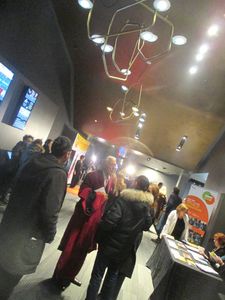 |
| Charles Schumann in a bubble at the Landmark at 57 West Photo: Anne-Katrin Titze |
AKT: I didn't expect you to remember! You say in the film when you're boxing that you're fearless.
CS: Fearless? Yeah, yeah, I have no fear. Not at all.
AKT: So much so that it's almost turning into a danger?
CS: Yeah, because sometimes ... I have been boxing for so long. And I have a very huge self confidence.
AKT: Does that have something to do with dealing with so many people in the bar?
CS: Not really. I'm boxing because it keeps me in shape. And I need it because sometimes my work, I say it in the film too, it's very long, very hard. You need - in German we say "Ausgleich".
AKT: Balance.
CS: Balance! And boxing is a very big balance for me.
AKT: There's a great quote from Buñuel's autobiography, My Last Sigh, in the film. I love the book, I didn't remember anything about him making cocktails, though.
CS: He's mixing. But very lousy. Gin, martini.
AKT: Eckart Witzigmann, the famous chef, is in the film. I didn't even recognise him at first. You have not changed that much.
CS: We are very old friends, forever friends. He's the same age.
AKT: Is he a regular at your bar?
CS: He's not a regular. He is very tired.
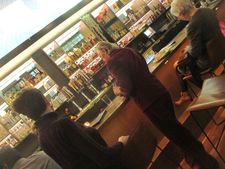 |
| Charles Schumann at the bar about to live up to his motto "shake the shaker, not yourself." Photo: Anne-Katrin Titze |
AKT: You mention at one point that shaking a cocktail is not a circus. But it can have something to do with magic?
CS: Yeah. If you see someone perfectly shaking it's great. It's really a performance. It's a ceremony. In Japan it's a ceremony.
AKT: The way the ice is cut is beautiful.
CS: The ice, yeah.
AKT: Ice is a theme in the film when you talk to the guy in New York about the history of the cocktail. It's fascinating to hear about the 19th century. So cocktails were officially invented in 1807?
CS: Nobody knows it exactly. Maybe the historians know it better. My friend [Robert] Simonson wrote a fantastic book about cocktail history.
AKT: It never crossed my mind to think about what people were mixing and drinking in the 19th century. Of course people must have always been mixing things. But the idea of the cocktail is so 20th century for me.
CS: If you see it in the right way, people made always cocktails. Always. But they didn't make cocktails professionally. They made them professionally maybe in the 19th century.
AKT: When you think of Germany and bars before your time, before you reinvented the idea of what a bar is with Schumann's, what comes to mind is maybe Hans Albers Auf der Reeperbahn. A very different idea of bar.
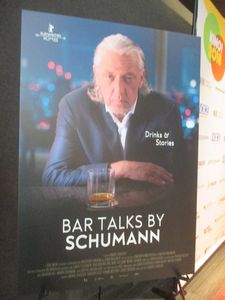 |
| Bar Talks By Schumann poster at the Landmark at 57 West Photo: Anne-Katrin Titze |
CS: You think so?
AKT: Germany and bars, you might think Weimar Republic, Berlin, Twenties…
CS: I suppose in the Thirties we had a lot of bars in Germany before the Second World War. There were many many many very famous bartenders from Germany who came to New York. Kaplan, Schmidt, a lot of German bartenders became very famous in the States. Before I opened my bar it was very difficult to find a bar outside a hotel. Most of the bars were situated in hotels.
AKT: I noticed that a lot of the people involved with bars have tattoos.
CS: It's like this at the moment.
AKT: You don't have tattoos?
CS: No, I don't need them.
AKT: I perfectly understand. I like what you're wearing throughout the film.
CS: You know, I worked for a very long time in the fashion industry. I worked for a lot of Japanese people, [Yohji] Yamamoto, [Issey] Miyake and in Germany for Hugo Boss. They always gave me clothes. Then I created my own style.
AKT: Suits are a big part of that. What does the suit do to you? We don't see you in a shapeless sweater very often.
CS: I always say my suits are my life. When I go out in the morning and have the wrong suit on I feel very badly. So I have always a second suit in my car.
AKT: And coming here?
CS: I came here with four suits.
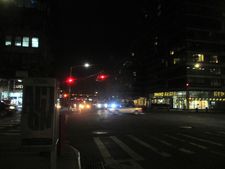 |
| West 57th Street, New York City and the lights of New Jersey across the Hudson River Photo: Anne-Katrin Titze |
AKT: You're feeling okay with the red suit tonight?
CS: Yeah. I wanted to wear a blue suit but Marieke told me she's wearing a blue suit. "You have to wear …" I said okay.
AKT: I read that Maxim Biller was supposed to be in the film. Where was he? Did I not recognise him? Was he in the film?
CS: You know him?
AKT: We've met a few times.
CS: Maxim Biller is a friend of mine. In the Victoria Bar in Berlin he talks about Schumann's. Maxim Biller and Claudius Seidl, the two journalists talk about the importance of the Schumann's Bar in their life.
AKT: I didn't see that. [I feel as though I entered 2017 Twin Peaks territory. Did these people age so much that I did not recognize them? Had I fallen asleep? The answer came ten minutes later when I spoke to Marieke Schroeder, the director of the film, who informed me that what was shown at KINO!, what I had just seen, was an American version which did not include the writers talking about how much the bar meant to them.]
CS: You will see it again, I hope.
AKT: I shall see it again! "Better, nobler laws" have to rule inside the bars, someone says in the film. Do you agree?
CS: Not always. Sometimes there are no laws. A bar needs the rules. With no rules it's very difficult to have a bar for a long time.
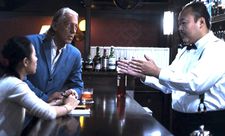 |
| A bartender in Tokyo captures Charles Schumann's attention in Bar Talks By Schumann |
AKT: And the nobility? Do you have to counter the drunkenness with nobility?
CS: No, no. The most important thing in a good bar is that you stop people drinking when they have enough. You stop before. Because this is not a good bar when the bartender fills up people. He says, "Okay, now it's enough, go home, come tomorrow again."
AKT: How would you describe the people coming to Schumann's at the Odeonsplatz location now?
CS: It's different. Because we have such a huge place. It's easier and not easy. It's easier in one way because I don't have to stand at the door. In the old bar I always was at the door on the weekend. Because even if you told the people the bar is too crowded, they stepped in. In the huge bar we find always a place.
AKT: And the people themselves?
CS: It's different. It's not like before. Before we had very intellectual people. Now we have less. We have a lot of young people. In Germany, we have the expression "Schicky Mickeys". We have no "Schicky Mickeys". We have a good crowd.
Bar Talks By Schumann will screen on Tuesday, April 10 at 6:00pm
KINO! in New York runs through April 12 at the Landmark at 57 West cinema.








